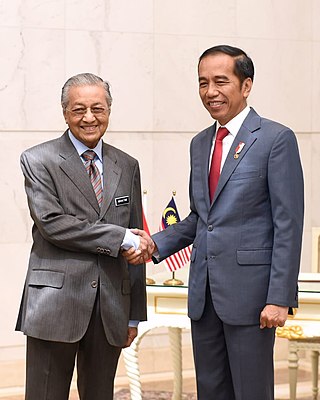
Since independence, Indonesian foreign relations have adhered to a "free and active" foreign policy, seeking to play a role in regional affairs commensurate with its size and location but avoiding involvement in conflicts among major powers. During the presidency of Sukarno, Indonesia's foreign relations were marked by engagement with other newly independent nations in Asia and Africa, as exemplified by the Bandung Conference, the subsequent foundation of the Non-Aligned Movement and a confrontational attitude towards Western powers, justified by a belief in the CONEFO and opposition to what Sukarno termed as NEKOLIM.

The Ministry of Foreign Affairs of the Republic of Indonesia or commonly known by its abbreviation Kemlu, is an Indonesian government ministry responsible for the country's foreign politics and diplomacy. The ministry was formerly known as the Department of Foreign Affairs until 2008 when the nomenclature changed with the enactment of the 2008 State Ministry Act.

Indonesia and Sri Lanka established diplomatic relations on 6 August 1952. Both nations share some cultural similarities. Indonesia and Sri Lanka are members of numerous organizations such as the World Trade Organization and Indian-Ocean Rim Association. They are also founding members of the Non-Aligned Movement. Indonesia has an embassy in Colombo, while Sri Lanka has an embassy in Jakarta.

Afghanistan and Indonesia established diplomatic relations on 20 May 1950. The relationship is mostly founded on common religious solidarity, as Indonesia is the world's most populous Muslim majority country, and Afghanistan is also a Muslim-majority country. Indonesia has expressed its commitment to support and assist the rebuilding of Post-Taliban Afghanistan in various sectors, including technical training, infrastructure, women's empowerment, higher education, and diplomat training. Indonesia has an embassy in Kabul, while Afghanistan has an embassy in Jakarta. Both nations are full members of Non-Aligned Movement and Organisation of Islamic Cooperation.
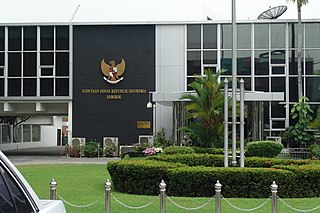
The Embassy of Indonesia in Bangkok, a diplomatic mission of the Republic of Indonesia to the Kingdom of Thailand and concurrently accredited to the United Nations Economic and Social Commission for Asia and the Pacific (UNESCAP), is located at 600-602 Petchburi Road, Ratchathewi District of Bangkok. The first Indonesian overseas mission in Bangkok was opened as the Indonesian Office (INDOFF) in 1947, which was promoted to Legation in 1949, and later Embassy in 1956.

The Embassy of the Republic of Indonesia in Kuala Lumpur is the diplomatic mission of Indonesia in Malaysia. The embassy serves large amounts of Indonesian migrant workers in Malaysia. Other Indonesian diplomatic establishments in Malaysia include four consulate-generals in Johor Bahru, Kota Kinabalu (Sabah), Kuching (Serawak), and Penang, and a consulate in Tawau.

The Embassy of the Republic of Indonesia in Budapest is the diplomatic mission of the Republic of Indonesia to the Republic of Hungary. The first Indonesian ambassador to Hungary was Sarino Mangunpranoto (1962–1966). The current ambassador, Abdurachman Hudiono Dimas Wahab, was appointed by President Joko Widodo on 7 January 2019.
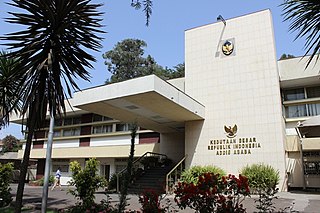
The Embassy of the Republic of Indonesia in Addis Ababa is the diplomatic mission of the Republic of Indonesia to the Federal Democratic Republic of Ethiopia. The embassy is concurrently accredited to the Republic of Djibouti. In addition, the ambassador serves as the Indonesian representative for the African Union. The first Indonesian ambassador to Ethiopia was Suadi Soeromiharjo (1964–1968). The current ambassador, Al Busyra Basnur, was appointed by President Joko Widodo on 7 January 2019.

The Embassy of the Republic of Indonesia in Amman is the diplomatic mission of the Republic of Indonesia to the Hashemite Kingdom of Jordan. The embassy is concurrently accredited to the State of Palestine. The first Indonesian ambassador to Jordan was Zainul Yasni (1985–1988). The current ambassador, Ade Padmo Sarwono, was appointed by President Joko Widodo on 25 October 2021.

The Embassy of the Republic of Indonesia in Beijing is the diplomatic mission of the Republic of Indonesia to the People's Republic of China. The embassy is concurrently accredited to Mongolia. Indonesia also has three consulate generals in Guangzhou, Hong Kong, dan Shanghai. The first Indonesian ambassador to China was Arnold Mononutu (1953–1955). The current ambassador, Djauhari Oratmangun, was appointed by President Joko Widodo on 20 February 2018.

The Embassy of the Republic of Indonesia in Beirut is the diplomatic mission of the Republic of Indonesia to the Republic of Lebanon. The first Indonesian ambassador to Lebanon was Dalindra Aman in 1996. The current ambassador, Hajriyanto Y. Thohari, was appointed by President Joko Widodo on 7 January 2019.
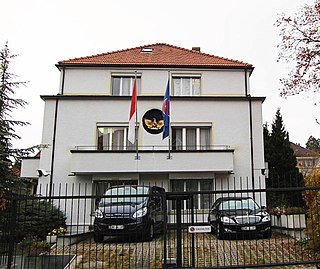
The Embassy of the Republic of Indonesia in Bern is the diplomatic mission of the Republic of Indonesia to the Swiss Confederation. The embassy is concurrently accredited to the Principality of Liechtenstein. The permanent mission of the Republic of Indonesia to the United Nations, World Trade Organization and Other International Organizations is located in Geneva. The first Indonesian ambassador to Switzerland was Alfian Yusuf Helmi (1952–1955). The current ambassador, Muliaman Darmansyah Hadad, was appointed by President Joko Widodo on 20 February 2018.

The Embassy of the Republic of Indonesia in Caracas is the diplomatic mission of the Republic of Indonesia to the Bolivarian Republic of Venezuela. The embassy is concurrently accredited to five other surrounding countries:
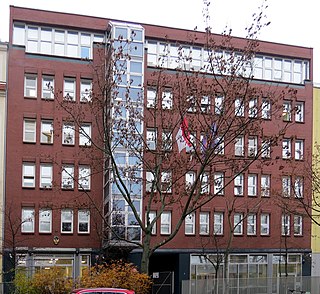
The Embassy of the Republic of Indonesia in Berlin is the diplomatic mission of the Republic of Indonesia to the Federal Republic of Germany. In addition to the embassy, Indonesia has two consulate generals in Frankfurt and Hamburg.

The Embassy of the Republic of Turkey in Jakarta is the diplomatic mission of the Republic of Turkey to the Indonesia. Turkish Embassy in Jakarta was opened on 10 April 1957. The Turkish Embassy has been serving at its current chancellery in Kuningan, Jakarta since 1983.

Cyprus–Indonesia relations refer to foreign relations between the Republic of Cyprus and the Republic of Indonesia since 1987. Both nations are members of the World Trade Organization and the United Nations.
This page is based on this
Wikipedia article Text is available under the
CC BY-SA 4.0 license; additional terms may apply.
Images, videos and audio are available under their respective licenses.


















